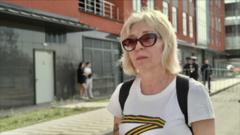Following extensive Ukrainian drone attacks, at least 60,000 air travelers find themselves stranded in Russian airports as over 350 flights are canceled across major cities. This disruption comes amid a backdrop of a tense and complicated ceasefire proposal, further fueling the ongoing conflict between Ukraine and Russia.
Ukrainian Drone Attacks Leave 60,000 Passengers Stranded in Russia

Ukrainian Drone Attacks Leave 60,000 Passengers Stranded in Russia
A massive wave of Ukrainian drone strikes has disrupted air travel in Russia, affecting thousands as tensions escalate amid ongoing conflict and proposed ceasefire talks.
At least 60,000 air passengers are currently stranded in Russian airports due to a significant Ukrainian drone offensive, according to reports from local officials. The Russian Association of Tourist Operators (Ator) has indicated that more than 350 flights have been affected, impacting major travel hubs in Moscow, St Petersburg, Sochi, and several other cities since Tuesday evening.
The Russian defense ministry claims to have intercepted an unprecedented number of 524 Ukrainian drones within a 24-hour period, a figure that would mark a record if verified. Fortunately, there were no reported casualties resulting from these attacks. In a contrasting narrative, Ukraine asserts that an overnight Russian drone and missile strike resulted in the deaths of two civilians in Kyiv.
This escalation coincides with a three-day ceasefire announced by Russian officials, which was intended to coincide with commemorations for the World War II victory parade in Moscow on May 9. Ukraine has dismissed this ceasefire proposal as disingenuous, referring to it as a "theatrical play", and is advocating for an unconditional 30-day ceasefire, a call also echoed by Western allies.
The political arena saw U.S. Vice-President JD Vance remark that the conditions put forth by Russia for peace talks were excessive. His comments indicate a potential shift in the U.S. stance toward Moscow, while simultaneously expressing a desire for dialogue between the conflicting parties.
Major air travel disruptions in Moscow involved three key airports: Vnukovo, Sheremetyevo, and Domodedovo, with 110 cancellations reported in the capital alone. Moscow Mayor Sergei Sobyanin confirmed the interception of 19 drones close to the city since Tuesday. The situation worsened in St Petersburg, where 55 flights faced cancellations or delays. Footage from Pulkovo airport revealed long lines of aircraft waiting to land, as passengers endured hours of delays.
As air traffic problems unfold in Russia, global leaders are attempting to attend the upcoming military parade commemorating the victory over Nazi Germany. This includes unexpected travel delays faced by Serbian President Aleksandar Vucic, whose flight was delayed due to ongoing drone attacks. Furthermore, Slovak Prime Minister Robert Fico expressed frustration with other Baltic nations that restricted his airspace access.
This heightened tension follows Russia's full-scale invasion of Ukraine in February 2022, resulting in Moscow controlling around 20% of Ukrainian territory, including Crimea, which it annexed in 2014. Vance emphasized the importance of establishing basic guidelines for dialogue between the two countries while maintaining a cooperative stance with European allies.
Following the drone strikes in Kyiv, Ukrainian President Volodymyr Zelensky has called for increased global pressure on Russia, stressing that Ukraine cannot guarantee safety for those attending the Moscow parade. As the situation evolves, the Ukrainian foreign ministry has strongly condemned any foreign troop participation in Russian commemorative events, labeling it as an attempt to downplay war crimes attributed to Moscow.
In the lead-up to the parade, Chinese President Xi Jinping reinforced the strength of China's relationship with Russia, marking China's participation through a significant military contingent. This coincides with Victory Day, a major holiday in Russia that commemorates the Soviet Union's triumph over Nazi Germany, a narrative that Putin aims to align with the current conflict against Ukraine, a characterization that Ukraine and its allies vehemently dispute.



















